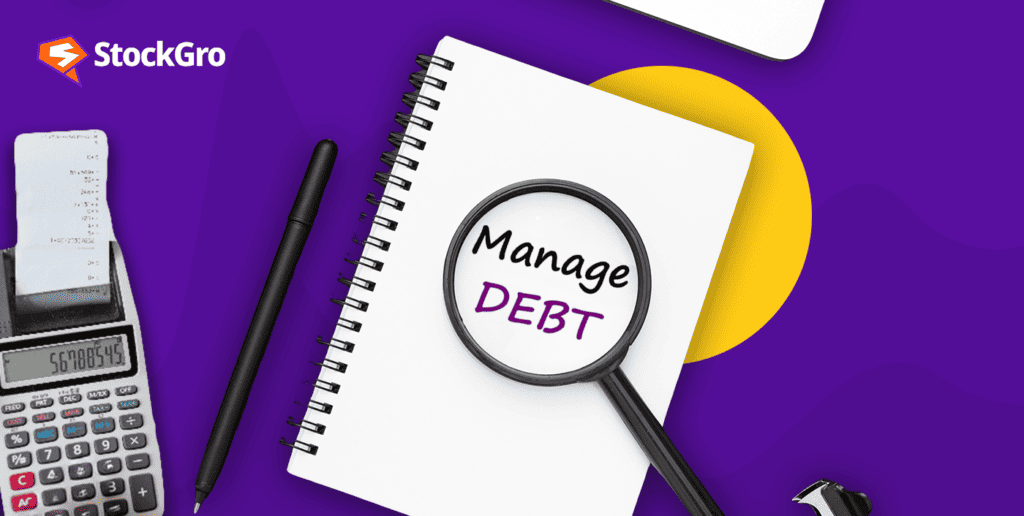
Do you have debts? If yes, you would already know the kind of obligation and burden it creates. Having too many debts stops you from living your life comfortably and spending on the things you enjoy because the responsibility to pay off the debt is always running in your mind.
So, for all those borrowers wondering if you are stuck in this trap forever, here’s the good news. No, you are not stuck forever, and there are ways to come out of your debts. Today’s article will take you through some debt management strategies to help you manage and clear your debts wisely.
What are debts?
In simplest terms, debts are loans. They are borrowings taken by individuals, corporations, government and other entities from lenders, with a promise to repay the money in future. An important component of debt is the interest payment, besides repaying the principal, which makes the concept of debt burdensome and hectic.
Also read: Debt instruments in India: Understanding your investment options
Why is debt management essential?
Debt management is a significant aspect of financial planning that revolves around:
- Liaising with the right parties at fair terms
- Formulating plans to manage timely interest payments without compromising on the usual lifestyle
- Planning strategies to repay and close the debt early
Debt management strategies for individuals
Individuals take various forms of debt, including loans from friends and family, besides taking personal, vehicle, home loans, etc., from financial institutions like banks and NBFCs.
Sometimes, borrowers become incapable of paying their debts and take new loans to clear off the old ones. This way, they fall into a debt trap, with one debt following the other. It may not be possible for everybody to stay away from debts, but organising them and planning their repayment is in our control. It is an important money management skill.
Analyse and review
The first step in debt reduction and management is to analyse your current financial position. The analysis involves going through your income, prospects, expenses, existing debts, the requirement of debts in the future, etc. Ensure you account for all your monetary aspects to see if you have sufficient funds to clear some of your existing debts.
It is also necessary to analyse the quality of debts here. Debts can be broadly classified as good and bad debts. Good debts are those borrowings made to invest in assets that generate additional income or help in saving taxes. For example, investing in appreciating assets like commercial properties is a good debt. Such properties earn rent and also provide some tax deductions and exemptions.
Bad debts, on the other hand, are borrowings made to invest in non-growing assets. For example, a vehicle loan falls under this segment, as vehicles depreciate and do not generate income unless it is used for taxi services.
So, analyse the quality of debts and contemplate disposing the depreciating assets to clear bad debts.
Budgeting
Budgeting is the process of estimating your income and expenses to make a plan for your spending. Creating a budget helps to determine the available income based on which one can plan the expenses. Without a budget, the possibility of overspending increases.
Also read: What is a budget – A beginner’s guide
Creating a budget and frequently reviewing it helps track your spending and reduce unnecessary expenses. It also helps in planning your future investments without debts. As for existing ones, having a budget helps in prioritising the repayment of debt over other expenses.
Debt consolidation
Debt consolidation is a useable strategy for those having multiple loans. It is where borrowers take one huge loan to pay off all the other loans. By doing so, they eliminate the multiple interest payments and stick to one. It also reduces the overall interest rate payable on loans.
An example can help in understanding this better. Mr A has a personal loan at 12% and a credit card loan at 11%. He reaches out to a debt consolidation company to give him a consolidated loan to clear the two existing ones. Now, he has only one loan with the debt consolidation company at 10%.
Credit counselling
Credit or debt counselling involves talking to a counsellor about managing debts. These counsellors are specialists in money management who assist their clients in planning interest payments and clearing debts.
Credit counselling is beneficial for those who lack the knowledge of strategies to clear their loans. It is also helpful for those who do not have sufficient resources to meet their liabilities. The primary objective of such counsellors is to keep their clients away from bankruptcy.
Plan your debt-repayment
Some borrowers wait until the last day to pay their debts. Such individuals may feel the pressure if they have multiple loans maturing at the same time, or if they do not have sufficient funds to repay at the time of maturity. Hence, the right way to clear debts is to repay the principal as and when you have some accumulated funds.
The two popular strategies here are the snowball and avalanche methods. The snowball method is where borrowers clear smaller loans first and keep the bigger ones for later. It is suitable for those who wish to maintain sufficient liquidity.
The avalanche method is where bigger loans are cleared first and then the smaller ones. It is ideal for those looking to clear their commitments early on so that they can be worry-free later.
Improve financial literacy
While we are talking about this quite late in the article, financial literacy is the key to understanding the above strategies.
Financial literacy revolves around understanding your income, expenses and savings. It deals with having the required knowledge to make appropriate financial decisions. Hence, improving financial skills, such as budgeting, strategising investments, etc., is essential in managing debts.
Debt management strategies for businesses
Businesses are no different from individuals when it comes to managing debts. Managing debts is exceedingly crucial for a business, as the wrong handling of debts can lead to insolvency.
Businesses also follow similar strategies as individuals, along with a significant focus on improving revenue and cash flow. By doing so, they can invest their profits back into the business rather than overly relying on debts.
Also read: SIP investment: Your path to wealth building
Bottomline
Debt management is a vital aspect of financial planning. It helps people plan their finances and clear their obligations on time to avoid falling into debt traps. Clearing debts early on can help individuals focus and spend on the things they enjoy. Hence, learning and implementing debt management strategies are essential to achieving financial freedom and living a stress-free life.

